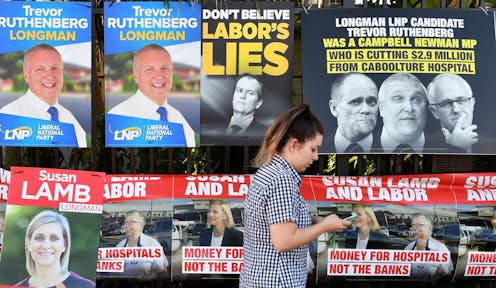Why party preselections are still a mess, and the courts haven't helped
- Written by Graeme Orr, Professor of Law, The University of Queensland

You join a political party. Its rules are over 100 pages long. And that’s only for your state division. There’s also an overarching “federal” party constitution.
Good, you think. Parties run parliament, our lawmakers should be be governed by rules about selecting candidates or expelling party members. But are they? Can you ask the courts to ensure your party’s powerbrokers abide by the rules that they, by and large, write?
It’s a simple question, but the answer to it is a mess, thanks to cases about recent high-profile interventions by national party leaders into Victorian Labor and the NSW Liberals.
What is going on? In part this is an historical tangle within common (in other words, judge-made) caselaw. In part, it is because the major parties have decided to upset 30 years of pragmatic acceptance of the obvious answer: serious rules, of registered parties, should be enforceable.
Parties as private social clubs?
Ninety years ago, Ned Hogan lost his pre-selection to stand for the Labor Party and was expelled from its ranks. Just weeks before, he had been Labor premier of Victoria. This drama – one of several splits that occasionally rend our parties – happened as the nation was divided about Depression-era austerity measures.
Hogan fought his peremptory treatment all the way to the High Court. In 1934, it ruled in favour of the party. Not on the merits, but because it equated parties to any “voluntary association […] formed for social, sporting, political, scientific, religious, artistic or humanitarian” interests. Unless the squabble concerned who owned property, the court would treat it as a private stoush.
Parties as semi-public bodies
Thirty years ago, this ruling was side-stepped. It had long been criticised for its unreality. A clear-sighted Queensland judge, John Dowsett, reasoned that whatever the mores of the 1930s, modern parties were deeply involved in public affairs. In particular, they register with electoral commissions and receive significant public funding.
Since 1992, a variety of Supreme Court judges, across numerous states, reinforced that finding. Party rules formed a contract, biding party members and administrators alike.
This didn’t mean open slather. First, non-members couldn’t insist party rules be enforced. (So parties could easily avert hostile takeovers). Second, only clear, usually procedural, rules were enforceable. (So statements of philosophy were treated as puffery). Internal grievance procedures had to be exhausted and members who sued late could be rebuffed.
Finally, the courts just interpreted rules, they didn’t re-write them. Rules might be democratic or hierarchical. With one caveat: they couldn’t completely oust any role for the courts.
First they came for the union boss…
In 2019, Anthony Albanese intervened personally to urgently expel construction union leader, John Setka, from Victorian Labor. This was in apparent violation of the state party’s procedures and misconduct triggers.
Setka challenged in court, but Labor convinced a Victorian judge to revert to 1934, and not hear the matter. Few seemed to lament this judicial washing of hands. After all, Setka has attracted much controversy in his personal, legal and union life.
Into 2021-22, the role of the courts became critical. First the national takeover of Victorian Labor was contested. Then, a similar gambit by Scott Morrison in NSW was decried as “carpet-bombing”, by Liberal members both moderate and conservative.
In the last month, appeal courts in Victoria, then NSW, crafted a third way. Courts should hear such disputes, but only if they are closely connected to some electoral law requirement.
This new approach is very fuzzy. The Victorian court said it covered pre-selections, since parties nominate their candidates via the electoral commission. The NSW court rejected that finding completely, suggesting that only questions such as who was the party’s agent for electoral registration were necessarily within judicial purview.
The High Court in a wedge
In each case, party members then sought leave to appeal to the High Court. In each case, in the past week, the High Court declined to be involved. Understandably, given the imminence of the election. Sometimes the clock runs down on any useful remedies, and complex questions deserve considered reflection.
Also, the merits of the claims were limited. Unsurprisingly, party rules often give wide power to national executives to intervene, take over a branch, and select candidates.
But in Delphic hints last Friday, two High Court judges tantalisingly implied the very narrow NSW approach was fine.
Membership bodies or top-down electoral brands?
Where do these judicial shenanigans leave us? First, until the High Court finds a suitable case to resolve the confusion, members in most states – but not necessarily the biggest two – may still seek the help of the courts.
Second, parties can run up costs by objecting to court hearings at will. Yet, if a party executive wants the courts involved (to suit their public agenda, or if there’s a fight between sub-factions in which the executive has no interest) it can simply not raise an objection to a hearing.
Finally, the law of parties in Australia is one-sided and underdeveloped. Parties get benefits, from public funding through to control of party names on ballot papers.
Yet they increasingly are constructed as mere electoral brands, disconnected from any social base.
Meanwhile, their dwindling band of active members – who pay up to $225 a year for the privilege – have limited say in party affairs. And little reassurance the courts will help them if they feel repressed by administrators ignoring their party’s own rules.
Authors: Graeme Orr, Professor of Law, The University of Queensland





